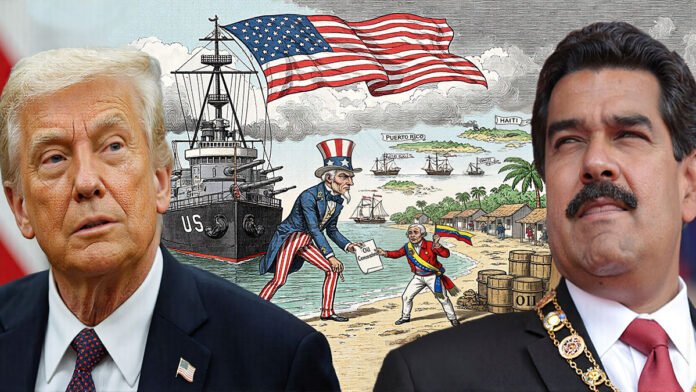Drug War Gunboat Diplomacy: Unmasking America’s Venezuelan Oil Grab
Gunboat diplomacy… the art of making offers that smaller nations can’t refuse by parking warships off their coasts, emerged during the nineteenth century when Western imperial powers carved up Asia, Africa, and the Middle East among themselves. The rules were elegantly simple: when conventional diplomacy failed to secure what empires wanted, fleets of warships would suddenly appear on the horizon of uncooperative countries. Usually, the mere sight of overwhelming naval firepower was enough to produce the desired capitulation without the mess of actual warfare.
This represents hegemony in its purest form, using military supremacy to enforce political and economic dominance over weaker nations. As American power grew throughout the twentieth century, so did the sophistication of its gunboat diplomacy. Henry Kissinger, that architect of imperial realpolitik, captured the essence perfectly:
“An aircraft carrier is 100,000 tons of diplomacy.”
Today, America’s gunboat diplomacy survives not in theory but in practice, anchored in the overwhelming reach of the U.S. Navy. For over a century, presidents from Woodrow Wilson onward have wielded warships as floating ultimatums, projecting power without ever needing to fire a shot.
In the Caribbean, this tradition persists. Yet against Venezuela, it resembles less a doctrine of diplomacy and more an act of piracy, coercion dressed up as statecraft.
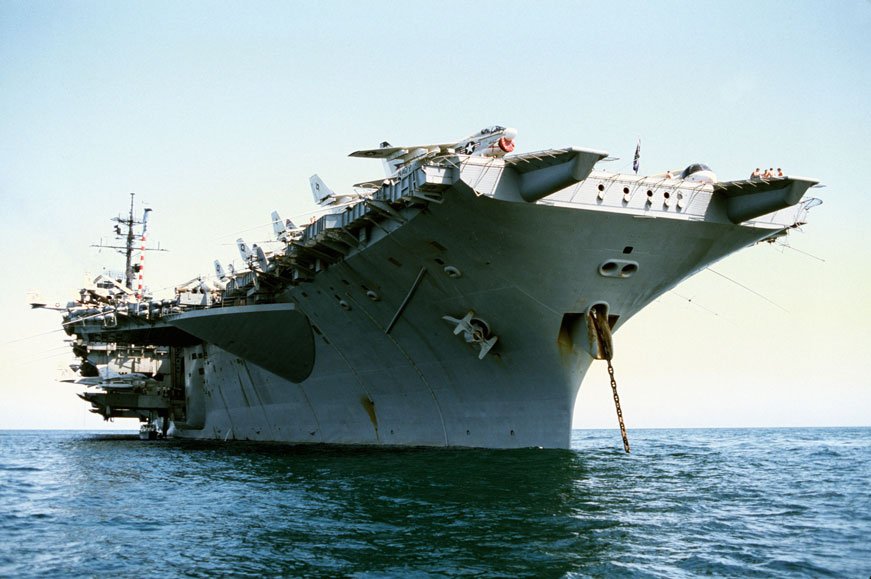
303 Billion Barrels of Truth: How US Military Targets Venezuela
When American warships steam toward Venezuelan waters under the banner of “fighting drugs,” anyone with functioning brain cells should ask why the world’s biggest consumer of cocaine is sending military hardware to solve a problem its own citizens create through insatiable demand. The answer isn’t found in Washington’s pious drug war rhetoric; it lies 303 billion barrels deep in Venezuelan soil.
The US Navy has sent at least seven vessels, including three guided-missile destroyers, an amphibious assault ship and a guided-missile cruiser, according to people familiar with the matter. A nuclear-powered fast attack submarine has also been deployed, according to the Times.
Donald Trump’s deployment of naval forces to the Caribbean represents the latest chapter in America’s endless imperial playbook: wrap naked resource grab in humanitarian language, deploy overwhelming military force against weaker nations, then act surprised when the world sees through such transparent deception. The $50 million bounty on President Nicolás Maduro’s head tells you everything about American priorities. This isn’t law enforcement, it’s regime change with a Hollywood budget.
The fact that Venezuela possesses the largest proven crude oil reserves on the planet, over 303 billion barrels, which dwarf Saudi Arabia’s holdings and make Canadian tar sands look like puddles. The Orinoco Belt alone contains enough extra-heavy crude to power global civilisation for decades, a treasure trove that American energy corporations haven’t been able to properly exploit since sanctions and political instability made extraction difficult.
Chevron, the last major US oil company operating in Venezuela, has lobbied desperately to maintain its foothold, warning that withdrawal would cede strategic advantage to Chinese and Russian competitors.
When American warships appear on Venezuela’s horizon, they’re not hunting drug smugglers; they’re protecting future drilling rights for corporations whose executives probably have more influence over US foreign policy than most senators.
The timing proves everything. While American cities face fentanyl epidemics that kill over 100,000 citizens annually, while Mexican cartels operate with near-impunity across vast stretches of the US border, Washington suddenly discovers that Venezuelan drug trafficking requires naval intervention.
The disconnect between stated objectives and actual deployment reveals imperial calculation masquerading as law enforcement.
The Imperial Playbook Never Changes
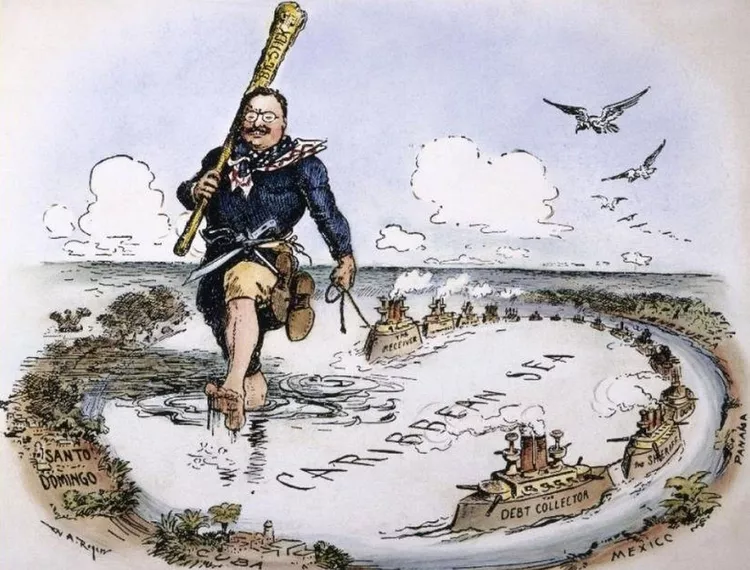
Latin America has endured this performance before, with only the costumes changing between acts. Yesterday’s communism becomes today’s drug trafficking becomes tomorrow’s terrorism, different excuses for identical objectives. In 1989, Operation Just Cause invaded Panama under identical pretexts, removing Manuel Noriega for “drug trafficking” while establishing permanent American military presence in a strategically vital region.
Plan Colombia funnelled billions into militarising the drug war, arming government forces whose paramilitary allies proved as brutal as any cartel, while coca production simply migrated to other regions. The “War on Drugs” became war on Latin American sovereignty, with body counts measured in hundreds of thousands while drug availability in American streets remained constant.
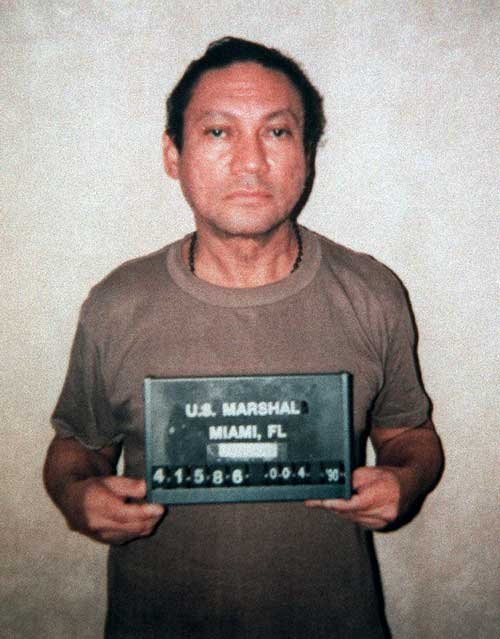
Now, Trump authorises treating Latin American cartels as “foreign terrorist organisations,” militarising what was once civilian law enforcement’s responsibility. This semantic sleight-of-hand transforms domestic American drug problems into foreign military threats, justifying interventions that international law would otherwise prohibit.
Follow the Money, Find the Truth
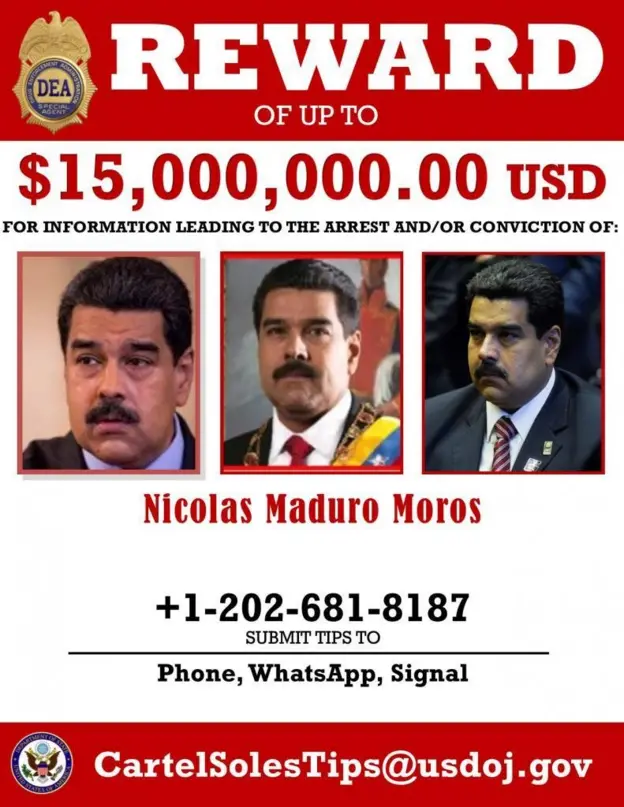
If Washington were genuinely serious about drug trafficking, it might investigate the American banking system that launders billions in cartel profits through respectable financial institutions. It might address the insatiable American demand for cocaine that creates the market incentives driving violence across Latin America. It might fund treatment programs for the millions of American addicts whose consumption fuels this entire deadly trade.
Instead, the crosshairs focus on Caracas, where a left-wing government sits atop energy reserves that could reshape global geopolitics if properly developed. Venezuelan crude could reduce American dependence on Middle Eastern suppliers, provide leverage against Russian energy exports, and generate profits that make today’s defense spending look like pocket change.
The real threat Maduro poses isn’t drug trafficking, it’s resource nationalism. His government’s refusal to surrender Venezuela’s energy wealth to American corporations represents the kind of defiance that historically triggers freedom-delivering interventions. When weaker nations claim ownership of their natural resources, Washington suddenly discovers human rights violations, democratic deficits, or drug trafficking that require urgent military attention.
The Human Cost of Imperial Theatre
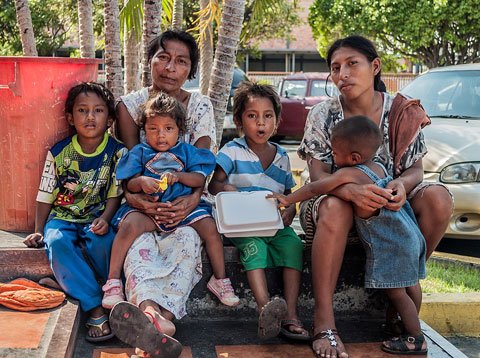
For ordinary Venezuelans already suffering under hyperinflation, sanctions, and economic collapse, American warships on the horizon bring not liberation but terror. They understand that US military intervention historically produces more destruction than the problems it claims to solve. Iraqi democracy, Libyan stability, Afghan women’s rights, the graveyard of American humanitarian interventions stretches across continents.
Maduro’s call for millions to join militias reflects not paranoid authoritarianism but rational response to credible threat. When the most powerful military in human history deploys against your government under flimsy pretexts, mobilizing popular resistance becomes survival strategy rather than political theater. The Venezuelan people may dislike their government, but they understand that American “liberation” typically produces outcomes far worse than domestic misrule.
The broader Latin American response reveals similar calculations. Regional governments that privately despise Maduro’s authoritarianism nevertheless oppose American military intervention because they understand that today’s humanitarian crisis becomes tomorrow’s precedent for their own destruction. Imperial power recognises no limits once established; success in Venezuela would encourage similar operations wherever American corporate interests face nationalist resistance.
Democracy Cannot Be Delivered by Destroyers
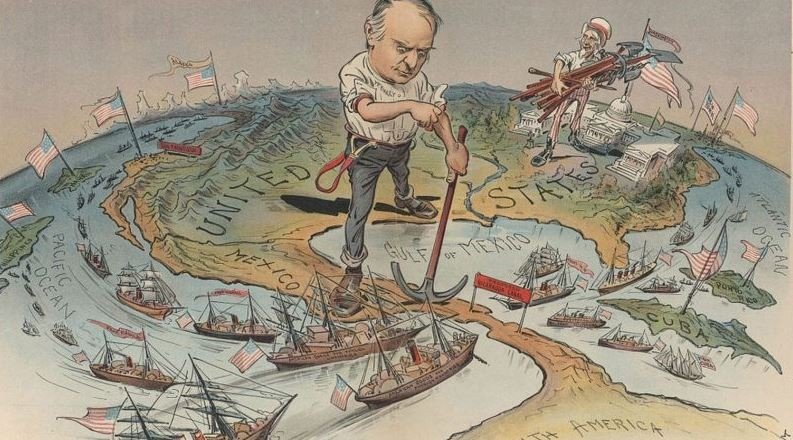
The fundamental contradiction in American foreign policy lies in using undemocratic means to achieve supposedly democratic ends. Warships, bounties, and military blockades represent the antithesis of democratic values, regardless of their stated objectives. When superpower military force becomes the primary tool for resolving international disputes, the result is imperial management rather than democratic development.
Genuine democracy requires institutions built through popular struggle, not imposed through foreign military intervention. The Venezuelan people must resolve their governance crisis themselves, without external military pressure that inevitably serves imperial rather than democratic interests. American warships in Venezuelan waters guarantee that any political transition will serve Washington’s energy priorities rather than Venezuelan popular will.
The Monroe Doctrine, America’s nineteenth-century claim to hemispheric hegemony, has never been formally abandoned because it never needed to be. Every generation of American politicians rediscovers that Latin American resources require protection from foreign influence, conveniently ignoring that the most dangerous foreign influence comes from Washington itself.
Stripping Away the Pretence
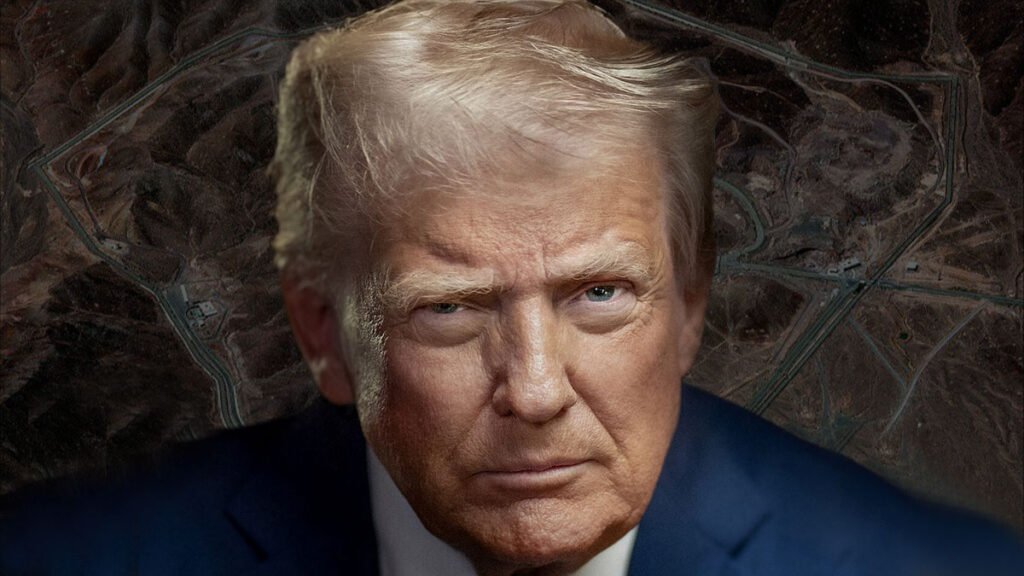
The Venezuelan crisis exposes how American foreign policy operates when stripped of diplomatic niceties. Drug trafficking provides convenient pretext for operations designed to secure energy resources and eliminate governments that resist corporate penetration. The humanitarian rhetoric that accompanies such interventions serves domestic political consumption rather than international legal justification.
British governments that support these operations through diplomatic backing or intelligence sharing become complicit in resource theft disguised as law enforcement. When Downing Street endorses American actions in Venezuela while British energy companies position themselves for post-intervention opportunities, they demonstrate that transatlantic alliance serves corporate rather than democratic interests, but then again, it always has…
The pattern repeats itself with numbing predictability: identify target nation with valuable resources, discover human rights violations or criminal behavior that requires international intervention, deploy overwhelming military force to remove non-compliant government, install regime friendly to Western corporate interests, express surprise when humanitarian situation deteriorates.
The Reckoning Ahead
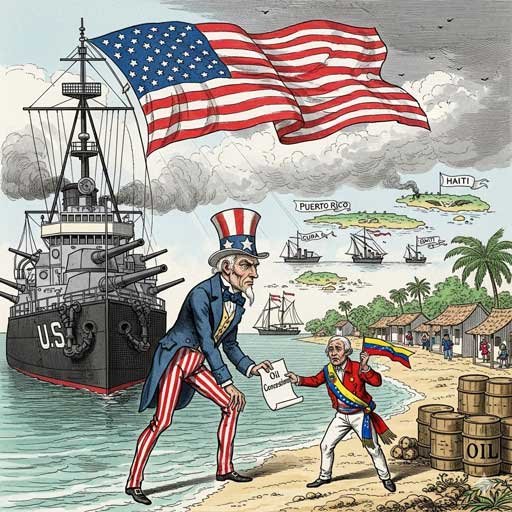
American warships circling Venezuela represent more than regional crisis, they signal the bankruptcy of international law when confronted by imperial greed. If military force can be deployed anywhere under humanitarian pretexts, if resource-rich nations face regime change whenever they resist corporate penetration, if international sovereignty means nothing when confronted by American corporate interests, then the post-war international order has already collapsed.
The Venezuelan confrontation will determine whether weaker nations can resist superpower pressure or whether the twenty-first century belongs entirely to those with sufficient military force to take whatever they want. Chinese and Russian responses to American Venezuelan operations will shape global power dynamics for decades, potentially triggering conflicts that make current regional instability look insignificant.
For working-class Americans whose tax dollars fund these interventions while their communities lack healthcare, education, and infrastructure investment, the Venezuelan operations represent familiar priorities: unlimited resources for imperial adventures, constant austerity for domestic needs. The warships steaming toward Venezuelan waters cost more than most American cities spend on social services annually.
The choice facing humanity is clear: accept a world where military force determines resource allocation, or demand international systems that prioritize human needs over corporate profits. Venezuelan oil belongs to Venezuelan people, regardless of whether their government pleases Washington or their energy policies serve American corporate interests.
The gunboats steaming toward Venezuelan waters have not come as liberators or even as the world’s policemen, they have come as thieves. These warships sail under the false flags of justice and democracy while their true purpose remains the plunder of a nation’s wealth. The drug war rhetoric, the humanitarian concerns, the democracy promotion… all are mere justifications to cloak this grand larceny in respectable language.
For working-class Americans whose communities crumble while their tax dollars fund these imperial adventures, the Venezuelan operations represent a familiar betrayal: unlimited resources for corporate theft abroad, perpetual austerity for human needs at home. The warships heading south cost more than most American cities spend on healthcare, education, and infrastructure combined.
Democracy cannot be delivered by destroyers, nor justice imposed by warships. The sooner Americans grasp this truth, the sooner their tax dollars might serve human need rather than corporate greed dressed up as humanitarian intervention. The age of gunboat diplomacy should have ended with the colonial empires that birthed it, yet here we are in the twenty-first century, watching the same imperial playbook execute the same resource grabs with the same transparent lies.
Venezuelan sovereignty hangs in the balance, but so does the principle that nations should control their own resources rather than surrender them to foreign corporations backed by overwhelming military force. The outcome will determine whether international law serves peoples or empires, whether the future belongs to justice or to those with the biggest guns.
Support Independent Journalism Today
Our unwavering dedication is to provide you with unbiased news, diverse perspectives, and insightful opinions. We're on a mission to ensure that those in positions of power are held accountable for their actions, but we can't do it alone. Labour Heartlands is primarily funded by me, Paul Knaggs, and by the generous contributions of readers like you. Your donations keep us going and help us uphold the principles of independent journalism. Join us in our quest for truth, transparency, and accountability – donate today and be a part of our mission!
Like everyone else, we're facing challenges, and we need your help to stay online and continue providing crucial journalism. Every contribution, no matter how small, goes a long way in helping us thrive. By becoming one of our donors, you become a vital part of our mission to uncover the truth and uphold the values of democracy.
While we maintain our independence from political affiliations, we stand united against corruption, injustice, and the erosion of free speech, truth, and democracy. We believe in the power of accurate information in a democracy, and we consider facts non-negotiable.
Your support, no matter the amount, can make a significant impact. Together, we can make a difference and continue our journey toward a more informed and just society.
Thank you for supporting Labour Heartlands
